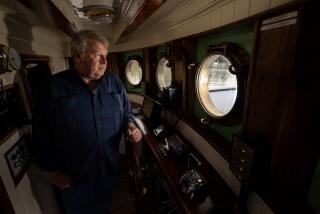Wresting Refuse From the Mississippi
EAST ST. LOUIS, Ill. — The catch on this brisk autumn afternoon is, frankly, not that great.
There were two really rusty bed springs. And one of those big orange barrels that road crews put up to divert traffic. Mostly, however, it was old soda bottles and crunched cigarette packages and what seemed like miles of knotted nylon fishing wire. Nothing too spectacular.
But Chad Pregracke isn’t disappointed. He digs this stuff. For five years now, he has been hauling junk out of the Mississippi River. And he still gets a charge from it--even on the days like this one, when he doesn’t find a refrigerator or a washing machine or a van to wrestle out of the murky water.
The van, by the way, was a 1970 Ford Econoline. Pregracke and his crew got it out. They also have hauled in the top half of a school bus. One 1950 International Harvester truck. And at last count: 3,608 tires, 1,012 steel drums, 64 television sets, four canoes and two prosthetic legs.
“We gotta clone that guy,” said Dean Rebuffoni, the Sierra Club’s Midwest representative. To clone Pregracke, however, you’d have to catch him. And that could be tough.
Pregracke is not a man to stand still.
He started his river cleanup mission when he was just a few years out of high school, with little but do-gooder zeal to back him up. He’d ply the Mississippi on weekends from his home base in East Moline, Ill., picking up whatever junk he could cart. It was never enough. So he decided to formalize his crusade.
Now there’s a nonprofit foundation, a board of directors and a roster of corporate donors to fund a $300,000-a-year budget. He just secured health insurance--even dental coverage--for his five crew members. Pregracke even has an official salary: $25,000 a year, “if I can raise the money,” he said. He’s won a prestigious award from the U.S. Fish and Wildlife Service. His work has been featured on CNN and in Time and Life magazines.
But when the 26-year-old Pregracke is out digging gunk from sandbars, his mom still is the one answering his e-mail. His office is a room over his parents’ garage.
And he still gets his biggest rush from knocking the snakes out of a mud-encrusted pesticide drum and loading it onto his floating barge of trash.
Anheuser-Busch Cos.’ O’Douls is one of his biggest corporate sponsors. But when he comes to St. Louis to give talks to Anheuser-Busch employees, he refuses to let the brewery put him up in a hotel. He sleeps in his car instead. Doesn’t want to waste their money.
The business side of running a business is, truth to tell, not his strong suit. There’s workers’ compensation to think about, and taxes and insurance and remembering to give credit to the correct corporate sponsors. (He keeps referring to Anheuser-Busch as a donor, then corrects himself with a groan: “They get mad every time I say it’s Anheuser-Busch. It’s O’Douls, the beer. I’m sponsored by a product.”)
Perhaps the biggest headache of all, however, is disposing of the garbage. More than 8 million people live along the Mississippi. And from the looks of it, every one of them must have chucked an old Big Wheel or a broken toilet or a milk crate or a lawn mower over the banks at some time or another. Plenty more debris no doubt was carried into the river during floods or floated out of marinas or fell off passing yachts.
Pregracke and his crew collect it all in small metal work boats. At the end of each day, they transfer it to an enormous, rusty barge, which looks like what it is--a floating landfill. When the barge gets crammed, the team spends days sorting through the collection, separating out recyclables and hauling the rest to local dumps, where they pay to unload it.
It’s filthy, stinky, exhausting work.
Pregracke loves it.
And somehow, he inspires others to love it too.
With his freckle-dusted grin and his bounding enthusiasm, Pregracke makes hauling old propane tanks seem almost glamorous, the free-spirited, river-rat adventure of a lifetime. Huck Finn with blisters--and a serious purpose.
Under a gorgeous, cloud-swirled sky one recent day, a dozen Anheuser-Busch employees joined Pregracke and his crew for a cleanup in East St. Louis. They pulled on work gloves and safety goggles and fanned out along a rocky stretch of riverbank across the Mississippi from the Gateway Arch. They picked up bits of plastic and chicken wire, a Pepsi bottle, the rusty bed frames. In no time, they were sweating.
“I’m pretty much middle-aged now, and it’s easy to lose your idealism,” said Rose Cure, 42. “This is a good reminder that one person really can make a difference. Now I won’t feel like such a dork walking around my neighborhood with a plastic bag, picking up trash.”
Pregracke’s group, Living Land & Waters Inc., organizes similar community cleanups all along the upper Mississippi, in a different town every weekend. He also encourages locals to help him year-round by “adopting” a mile of the river and patrolling it regularly for garbage. So far, more than 50 miles have been spoken for.
But the main muscle is the houseboat crew: Pregracke and four or five of his buddies. He pays his crew members $50 a day. Plus they get free lodging (a sleeping bag on the boat) and free food (whatever they can cook or buy for cheap). Usually, they say they’re “between jobs” when they sign up. Most stick around for a year before they tire of it.
Shane Walraven, 28, is a recent and enthusiastic recruit, fresh off a stint as a tugboat laborer: “I got tired of griping to people about all the trash on the river,” he explained. “Now I finally have a job where I can do something about it.”
Despite contributions from big-name corporations such as Alcoa, Cargill and Caterpillar Inc., Pregracke’s organization has a patchwork feel. One of his houseboats was on its way to the junkyard when he intercepted it. The other was, as he puts it, “recycled from the bottom of the Illinois River.” He patched it up, but apparently not well enough: It sank on the Ohio River a few months ago. His tugboat, a fixer-upper, sank too. So did one of his metal work boats.
No one on his crew is a mechanic. When it comes to repairs, they basically wing it. Setbacks, needless to say, are legion. “I’m wore out,” Pregracke said after one particularly tough week. “I just wanted to go out there and pick up garbage. But there’s a lot more to do than that.”
Still, he’s not about to give it up.
He often says, with a somewhat rueful chuckle, that this is his career. He grew up on the banks of the Mississippi. He spent six years in the river as a commercial diver, hunting for freshwater clams. He wants to see it clean. “I feel like I’m in the Army,” Pregracke said. “I feel like I’m serving my country.”
River restoration experts point out that garbage is not the only problem plaguing America’s waterways. The biggest threat to the Mississippi, in fact, is not old washing machines but ordinary dirt--the polluted runoff from farms and construction sites that pours into the river, clogging the marshy back channels that provide key habitat for scores of species.
Pregracke does not address that issue directly. Yet his work raises public awareness of the river’s fragility--and helps kindle enthusiasm for other ecological efforts, said Jeff Stein, a Mississippi River specialist for the environmental group American Rivers.
And, tire by tire, beer can by beer can, Pregracke and his crew are making a dent.
“It’s a big river,” Rebuffoni says. “But yeah, he’s made a difference.”
More to Read
Sign up for Essential California
The most important California stories and recommendations in your inbox every morning.
You may occasionally receive promotional content from the Los Angeles Times.










